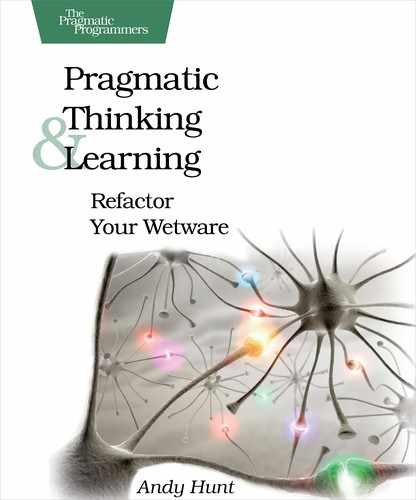Chapter
8
Manage Focus
A good question is never answered. It is not a bolt to be tightened into place but a seed to be planted and to bear more seed toward the hope of greening the landscape of idea.
I don’t need to tell you that we live in information-rich times. But perversely, the overabundance of information has resulted in a poverty of knowledge and attention. With so much available distraction, it’s easy to lose focus. Rather than wandering around in the middle of the information highway,[136] you need to take deliberate steps to manage what you’re thinking about.
Using the same approach as in Chapter 6, Learn Deliberately, you’ll need to manage thinking more deliberately. You need to be able to focus on the information that you want, filter the information you are bombarded with, and have the right information available to you at the right time, without being distracted by irrelevant details and without missing subtle clues that make all the difference.
In this part of the book, we are going to look at how to better manage your mind along these three axes:
-
Increasing focus and attention
-
Managing your knowledge
-
Optimizing your current context
Attention is the act of focusing in on an area of interest. You can pay attention only to a fairly small number of things; beyond that, events and insights will escape your notice. Many, many things are competing for your attention in our current environment. Some of them deserve it; most do not. We’ll look at ways to increase your ability to focus.
Sometimes we use the words information and knowledge interchangeably, but they aren’t the same thing. Information is raw data in a given context. For instance, the fact that Microsoft bought some company for a billion dollars is just information, and there’s no shortage of information these days. Knowledge imparts meaning to that information. You apply your time, attention, and skill to information to produce knowledge. Looking at that particular Microsoft acquisition and knowing how it might change the market, provide new opportunities, and destroy others constitutes knowledge. We’ll see a better way to organize your far-flung knowledge and insights.
Context, beyond the usage we’ve seen so far, is the set of stuff you are focused on at the moment. When you are debugging a program, for instance, all the variables, object interrelationships, and so on, form the current context. Think of it as the “working set” of information that you are dealing with at a given point in time.
Understanding these three interrelated topics will help you manage your mind more effectively.
The first thing you need to do is pay attention.
